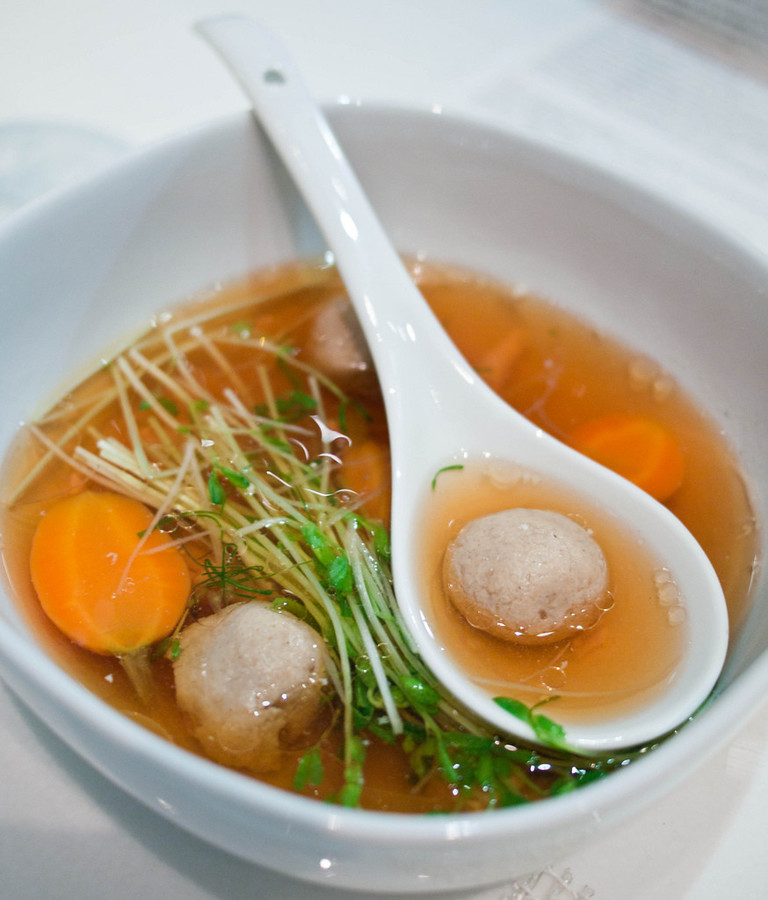Group preserves grandma’s recipes
Ayala Hodak usually cooks the way her mother taught her: adding a pinch of spice here or relying on her eyes — never a measuring cup! — to judge how much liquid to add.
But on a recent Tuesday, she was being much more precise.
At her spacious home in Tenafly, New Jersey, Hodak, 52, who grew up in an Iranian family in Israel, measured the amount of salt and pepper she added to a stew. She also paused to demonstrate how thickly to cut a piece of beef.
Her reason for the accuracy: Hodak’s recipe was being recorded by a new nonprofit, the Jewish Food Society, which aims to be an archive of Jewish recipes from around the world.
Its kibbutz-born founder, who once promoted Israeli culture as an employee of the Israeli Consulate in New York, was inspired by the diversity of food traditions in Israel and her desire to preserve them in the diaspora.
“I realized there is an urgency in capturing these stories because the older generation is about to leave the world, and many of these recipes are labor- and time-consuming in a way that we should really protect them,” the society’s founder, Naama Shefi, told JTA. “These are skills that would just disappear if no one could capture them in a methodic way.”
The project, which launched officially in March and receives financial support from several Jewish foundations, has added over a dozen recipes to its online archive, and more are on the way. Along with the recipes are photographs and stories of the cook’s family history, as well as how he or she learned to make the dish.
Each week, Shefi, 36, who lives on New York’s Lower East Side, interviews a chef and takes down his or her story. If distance permits, Shefi or an Israel-based employee will meet with the cook in person; if not, they communicate long distance. All ingredients are measured, and dishes are then recreated in a test kitchen and adjusted accordingly.
Though some participants work in the food industry, others are home cooks.
Shefi came up with the idea after a Shabbat meal in 2005 at the home of her now-husband’s grandmother, who was born in Turkey but also lived in Greece and South Africa prior to immigrating to Israel with her family.
“The flavors really represented all of their previous immigration stories and journeys, and some worlds that do not even exist anymore,” she said. “It was such a vivid expression of disappearing worlds, and of bitter and sweet memories. It was just moving, so I told him, let’s just spend a day with her try to capture a few recipes. It was just really inspiring.”
Shefi has always had an interest in food, though she did not get it at home.
“Good food wasn’t part of my childhood,” said Shefi, who grew up on Kibbutz Givat Hashlosha in central Israel. “Between the [kibbutz’s] communal dining room and the fact that my mom is not the best cook in the world, good food was out of reach.”
But “it became my life’s passion,” she said. “At the beginning just because it tasted really good, but later because I realized it tells a fantastic story about families and people and cultures.”
Now the Jewish Food Society, for which Shefi works full time, provides a way to combine her two passions: food and storytelling.
“For a while I was really interested in storytelling through filmmaking,” she said. “Still my main interest is storytelling, but the medium changed to food.”
In addition to the weekly cooking session, the nonprofit puts on larger-scale events, such as a Passover seder that showcased three Mexico-born Jewish chefs, and Schmaltzy, a yearly storytelling event where people share the stories behind family recipes. A Moroccan-style Mimouna, a bread-filled celebration held the day after Passover, is in the works, Shefi said.
Her family are Polish Jews, not Sephardi, but she said such distinctions blur in Israeli kitchens.
“Israel is a not just a melting pot, it’s a pressure cooker, so a Polish girl like me considered kubbeh as my own,” she told the New York Times.
Shefi’s long-term goal for the Jewish Food Society extends beyond the archive of recipes. She wants to establish a center for Jewish food in New York, where visitors would be able to take cooking classes and learn about their family’s culinary histories. Shefi describes her vision as “the James Beard Foundation for Jewish food.”
For now, the Jewish Food Society provides a way for Jews to engage with their culture, Shefi said.
“These [recipes and stories] are just huge parts of our lives, of our history as a people, and I feel that for many people that are less connected to Jewish culture and Jewish life, it’s a very inviting window to engage and to explore their identity,” she said.
Food also provides a lens through which to understand Jewish history, she added.
“I feel that recipes really carry our cultural DNA because they tell stories not just about a particular time in history, but also about how people used to live, how people used to celebrate, how people used to mourn, how people used to get together,” Shefi said. “It’s not just about the flavor and the food, it’s really about the experience.”
For her part, Hodak is excited to have her mother’s dishes — including Ghormeh Sabzi, a herb beef stew that her family would eat for Shabbat dinner, and a yogurt soup with cucumber and mint eaten on Shavuot — recorded for future generations.
“I thought it’s a great opportunity to spread my tradition,” she said, “to talk about my mother’s food and to keep it alive.”

 61.0°,
A Few Clouds
61.0°,
A Few Clouds 




